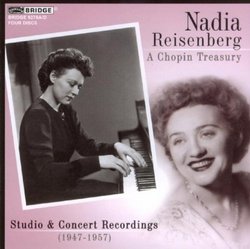| All Artists: Nadia Reisenberg Title: A Chopin Treasury Members Wishing: 0 Total Copies: 0 Label: Bridge Records Original Release Date: 1/1/2008 Re-Release Date: 10/14/2008 Genres: Dance & Electronic, New Age, Classical Styles: Instrumental, Chamber Music, Forms & Genres, Sonatas, Historical Periods, Classical (c.1770-1830), Modern, 20th, & 21st Century, Romantic (c.1820-1910) Number of Discs: 4 SwapaCD Credits: 4 UPC: 090404927621 |
Search - Nadia Reisenberg :: A Chopin Treasury
 | Nadia Reisenberg A Chopin Treasury Genres: Dance & Electronic, New Age, Classical
|
Larger Image |
CD Details |
CD ReviewsExtraordinary, heart-wrenching Chopin OperaCub | New England, USA | 01/06/2009 (5 out of 5 stars) "I bought these on a hunch, having researched Reisenberg online. I started listening in my car and found myself moved to tears (not a good practice in a moving vehicle). In the nocturnes and the sonata she manages a true singing tone, a bel canto line, that is unlike anyone I can remember. There is deep emotion, but a strong rhythmic structure to what she does, so that it never feels (a la Pogorelich, for example) that the music has been radically deconstructed to meet the artist's needs. I recommend these without reservation, even to those who may shy away from older, pre hi-fi recording techniques. There is just such integrity and humility in this playing, but never shyness or a lack of emotional projection. Emotional vulnerability at full voice and in full control." A most moving expression of Chopin Douglas Thorpe | Los Angeles, CA USA | 01/30/2009 (5 out of 5 stars) "The recordings of the nocturnes and mazurkas, the B minor sonata, plus three other pieces from the late 40's and early 50's are unbelievably beautiful; they capture the soul of Polish music like no other performer before or since! Ms. Reisenberg trained in Poland in her early years and that experience no doubt contributed to what seems to me to be the perfect merger of composer and performer. The sound is what one would expect from mono recordings made by a small company (Westminister) but Bridge has cleaned them up reasonably well. Don't let that deter you from enjoying the experience of these moving expressions of Chopin works." Worth every penny Dean, London | 10/09/2009 (5 out of 5 stars) "I can only endorse the comments made by the previous reviewers. The performances of the Nocturnes are exceptionally fine and sensitive. They were recorded during a traumatic period in Reisenberg's life, following the recent death of her husband, and she plays with great depth and feeling as well as delicacy. She tends to favour slower tempos, and is much closer in spirit to Claudio Arrau and Ivan Moravec than to some contemporary pianists who insist on playing Chopin as though he were Bach or Mozart. In Reisenberg's hands these pieces are beautiful, certainly, but there is also darkness, turmoil and more than a hint of tragedy, which is how it should be. The Mazurka set is remarkably comprehensive and would be a good alternative to Ashkenazy's Decca set for anyone who wants to hear an older recording.
The Nocturnes and Mazurkas were recorded in the mid-1950s and the sound quality is generally very good, although occasionally a little brittle in the higher registers. The Sonata No. 3 in B Minor, in contrast, is a late 1940s live recording from the Carnegie Hall and suffers from some background noise (but no more so than many other historical recordings). These recordings are indeed treasurable and provide proof (if any were needed) that you have to look beyond the big, famous names like Rubinstein and Pollini if you want to build a truly balanced Chopin collection. A set of this quality should never really be out of print and Bridge Records are to be commended for making it available once again with such excellent re-mastering. Although it is not cheap, it is a four CD set and worth every penny." |

 Track Listings (14) - Disc #1
Track Listings (14) - Disc #1